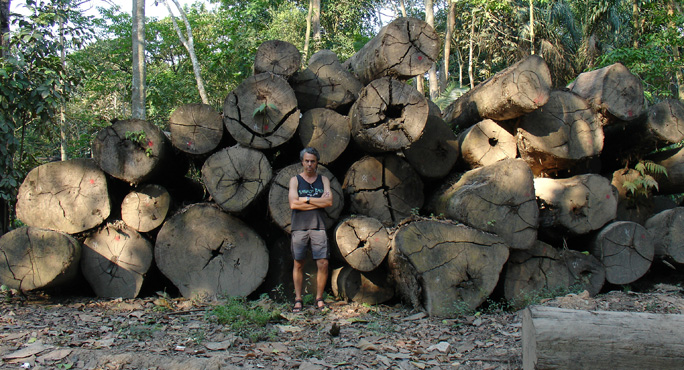Medicine Hunter Chris Kilham with Amazonian Rainforest Timber. Photo by Zoe Helene
Change is a constant in the natural world, but it is accelerating for a variety of reasons, a fact that has serious implications for botanical ingredient suppliers, participants at a recent industry congress were told.
Botanical ingredient suppliers, like any other agricultural sector, have always been at the mercy of local weather conditions. Droughts, floods, pestilence – these have always been part of the picture. What’s changed is that these conditions are now becoming less predictable and in some cases more severe and their effects are also less easily quantified when looking at ecosystems that have become degraded by human activity and therefore less resilient in dealing with natural vicissitudes.
Chris Kilham, a longtime expert in botanical ingredients and who works with French supplier Naturex on securing supplies of hard-to-source plants, laid the groundwork for the challenges facing industry.
“We are witness to and participants in the planet’s sixth big extinction,” Kilham said.
According to an article published in 2014 in the journal Conservation Biology, the underlying rate at which species disappear is about 100 per year. With humans in the picture, now more than 1,000 species are lost annually. While there is some debate about those relative numbers, few experts dispute that the extinction rate has dramatically increased in recent decades. It’s hard to know exactly how this situation affects individual ecosystems. Is that nematode or insect species that has declined dramatically or disappeared somehow critical to the long term health of that understory plant you are harvesting? In most cases, it’s anybody’s guess.
“It’s estimated that about 60% of the world’s natural environments are completely or partly destroyed by human activity,” Kilham said. “Will we have supply tomorrow? I can’t answer that but I can say that we will certainly have challenges maintaining that.”
Kilham also pointed to another hand that is rocking the supply boat. In the years since the Second World War the international economic system has been governed under the umbrella set by the Bretton Woods agreement, out of which rose the International Monetary Fund. China participated in that 1947 conference, but under the auspices of the Kuomintang government, which exists now only as a rump state in Taiwan. And in any case, the country was prostrate after the war, a situation which is now entirely reversed. China is now the world’s second biggest economy, and is poised to pass the US sometime in the next decade or so.
Kilham outlined the chaos that has afflicted the market for maca, a South American tuber that is both a traditional food source and a sexual health ingredient. The big destabilizing influence has been cash from China, which after years of strong economic growth now has the economic power to corner any market it chooses, he said. Naturex has had long term agreements with local farmers which carry benefits such as local dental clinics put up by the company, he said. The Chinese buyers have been acting on a cash-and-carry basis without long term commitments, he said.
He also pointed to the fact that many harvesters of wildcrafted botanicals live on pennies a day, and the relentless drive toward the lowest price will ultimately ruin these supply arrangements. A balance needs to be struck, he said, between a cash bonanza one year with no purchase agreement for the next and starvation wages that drive harvesters out of the trade.
“There are three billion people in the world living on less than $2 a day. One billion live on less than $1 a day. Companies in the industry are habituated to low prices regardless of the starvation wages that are implied in those arrangements. Unless we change our thoughts on the value of human labor we will see some of the most valuable plants go out of our industry,” he said.


